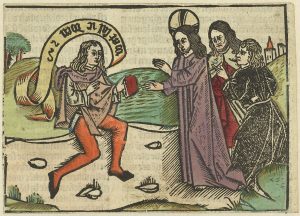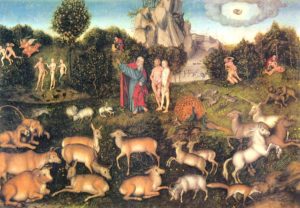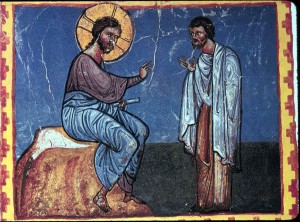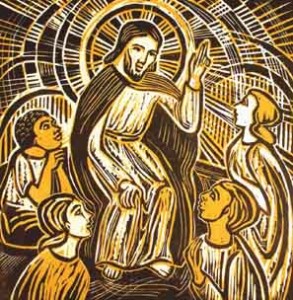Thoughts on Sunday’s Lessons for Oct. 6, 2024 (Pentecost 20B/Proper 22)

Job on the Ash Heap (c.1630), oil painting on canvas by Jusepe de Ribera (1591-1652). Sotheby’s, New York. (Click image to enlarge.)
First Reading (Track One): Job 1:1; 2:1-10
Why would an all-powerful, loving God allow bad things to happen to good people? The Book of Job is often held up as a guide to understanding this theological quandary, but this approach may leave the hopeful reader less than satisfied. What are we to make of its clear impression that God actually caused Job’s suffering because, incredibly, Satan talked God into testing Job as a sort of bet? As we read through Job in Track One this month, recognize it as an important part of the Bible’s wisdom literature, the books that unveil the authors’ ideas about life and God, seeking to explain the inexplicable.
First Reading (Track Two): Genesis 2:18-24
Think about relationships through Sunday’s unusually difficult Lectionary readings, trying to read them faithfully yet generously. Our Track Two first reading, for example, singles out the Genesis legend about God making Eve from Adam’s rib as a helper for the first man. Over the ages, this has often been interpreted to place women in a secondary status to men. Then in this week’s selection from Mark’s Gospel we hear another troubling passage: Jesus rejects divorce in words so strict and uncompromising that they have often been invoked outside their first century context to hold people in abusive relationships.
Psalm (Track One): Psalm 26
Just as Job, we are told, was “blameless and upright, one who feared God and turned away from evil,” Psalm 26 declares before God that the Psalmist has lived with integrity and trusted in God without faltering. Considering the trials of Job, we might wonder if the author of this psalm is tempting fate when he invites God to “test me … and try me.” We may also hear a hint of Pharisaical self-satisfaction in the writer’s desire not to be counted among the evildoers or to suffer their punishment. But in the end this plea is humble. It promises integrity and asks only for God’s pity and redemption.
Psalm (Track Two): Psalm 8
This beautiful psalm feels appropriate to a day when many congregations bless companion animals in memory of St. Francis of Assisi. It begins as a hymn of praise, celebrating the glories of God’s creation. In lyrical poetry it declares the beauty of the universe and all that populates it as testimony to God’s majesty: The heavens, the moon, the stars, all the work of God’s hands, are so great that mere humanity seems small in comparison. Even so, for better or for worse, we are given charge of all the wild and domestic animals and creatures of the sea.
Second Reading: Hebrews 1:1-4; 2:5-12
Now we begin seven weeks with the letter to the Hebrews, a journey that will carry us to the end of the Pentecost season. The letter to the Hebrews is thought to be an ancient letter to Jewish Christians who had gone back to Judaism for fear of persecution. While it is fervently pro-Christian, we should take care not to read parts of it as anti-Jewish. The verses we hear this Sunday recognize the stewardship over creation that God assigned to humanity in the Genesis creation stories, crowning human beings with glory and honor, “subjecting all things under their feet.”
Gospel: Mark 10:2-16
Jesus’s strict command against divorce is difficult to hear in modern times, when divorce has become acceptable, if unhappy; a troubled end to a relationship. In the patriarchal culture of Jesus’s time, divorce was even worse, because it was inequitable: A man could set aside his marriage for any reason, or keep his wife trapped in an abusive relationship. A woman had no recourse, could not practically initiate divorce, and worse, a woman alone was likely to end up homeless and hungry, shamed and reduced to begging. Should it surprise us that Jesus spoke firmly against that unequal practice, using language that recalled the words of Eve’s creation from Genesis?




 Gospel:
Gospel: